Even if you’ve personally never touched a JRPG in your life, you don’t need to be told that FINAL FANTASY VII REMAKE is a monumental occasion. Because whether experienced wholesale or parsed from 20+ years of cultural osmosis, it’s practically ingrained in everyone remotely interested in gaming how big a deal this icon’s revival is to millions of fans. Just as later Final Fantasy titles were for me, FF7 was the gateway drug by which a horde of ignorant ‘90s kids were exposed to the fast and loose world of JRPGs. And when you look at in retrospect, a large factor in this property’s long-enduring legacy (besides the obligatory “muh nostalgia”) is innately tied to how solid it was in redefining what games could be back then.
It was a title that accepted its genre’s usual fantasy whimsy, but supplemented it with grit and sci-fi style. It strove for the cinematic, being thematically dense and full of heavy moments, but kept tone in check with odd encounters and colorful side distractions. And perhaps most importantly, its cast was complex and deceptively nuanced compared to just about any other that came before it, starting as trope fodder but gradually built into defined individuals that players could latch onto emotionally during the game’s most iconic sequences. These are the parts that fans attach themselves to and fondly remember, even if games have since evolved well beyond the benchmarks FF7 inadvertently created. And while this 2020 offering realistically only covers the introductory portion of the whole inevitable package, FINAL FANTASY VII REMAKE proves to be a solid modernization, adding and modifying the choices of its progenitor while still retaining the same spirit of what made the original a classic.
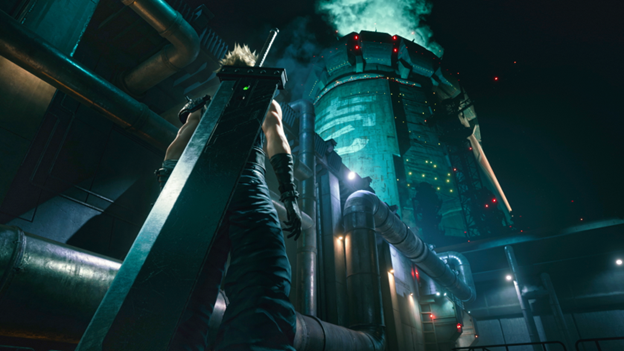
Alright, everyone… Let’s mosey
Before delving into what makes FF7R work, though, it’s worth addressing that incessantly lingering feeling most people will (and at this point, have) come into the experience with: the expectation that comes with being a remake. The industry’s made no secret of its obsessive fixation in remaking beloved IPs the past few years, with titles like SHADOW OF THE COLOSSUS and the RESIDENT EVIL remakes being among the most recent, lucrative examples. But with a game on such an ungodly high pedestal as FINAL FANTASY VII, it’s all but guaranteed for FF7R to harbor a nigh-unattainable expectation placed upon it by both new and old fans alike: the former expecting the myth constructed around it to be accurate, and the latter a strict recreation of how they remember it, just with better graphics.
But here’s the rub: FF7R can never be the original, nor does it explicitly want to be. The two may share the same DNA (insofar that the original’s key staff members are spearheading the Remake project), but they’ve been made with two completely different mindsets in two utterly different points in time and cultural relevance. FF7R will always feel different because, frankly, both the FF7 universe and RPGs as a whole have just evolved significantly in 20-odd years; this game could only exist in a post-FF7-compilation, post-RPG “revolution” world, and in knowing that fact takes advantage by deliberately making its strengths shine brighter when you acknowledge its place in the original’s history. FF7R is not a replacement or a by-the-numbers replication: it’s a supplement and an expansion.
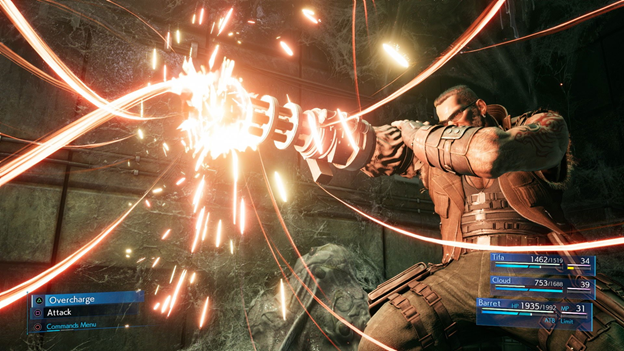
Let the Battles Begin
To showcase this, one need only look at arguably the game’s biggest modernization jump. From a design standpoint, the turn-based ATB system that defined early Final Fantasy combat fulfilled its job for the time it was made in, but when put under the lens of a modern title feels antiquated, stilted, and kind of lifeless. But rather than alienate old fans by nixing the system altogether or inversely temper the rush of contemporary RPG action for new fans, FF7R integrates the two styles together into a sort of “KINGDOM HEARTS plus ‘bullet time’” situation. And at least personally, it proves to be a solid evolution of the original’s concept.
You arguably get the best of both worlds: the standard combat gives the player all the intimacy and fluid movement of your standard real-time hack-n-slash, while the ATB component has you slow the tempo to play strategic, spending accumulated charges to use items, spells, or some more heavy-hitting skills to pressure the enemy and rack up damage. What’s most telling, though, is that these two systems are linked in such a way that one cannot function without the other, actively making you engage in both the new and the old; you can’t build up precious ATB unless you play the action game bits and land successful hits with your different party members, and duels against the game’s wild boss fights can’t be won unless you use the command menu to exploit weaknesses, keep your health topped off, or otherwise tip the scales for your team. It’s a compromise that keeps encounters feeling fresh yet familiar, and considering how much more often you spend time duking it out in FF7R compared to the original, it’s a good feeling to have.
This is without even considering all the other battle-related positives, like a revamped materia system, the distinct play style variations you get from switching control between your party members, or the fact that every weapon is 100% viable and unique in how they influence your team composition. In short, the degree of depth brought to the remake’s kit is honestly kind of unreal for any FF title, even the more contemporary ones. And though I’m sure no one’s picked up this title explicitly for the fighting aspect, the effort the game puts into fleshing out and modernizing its older systems while still making them functionally “new” (and, y’know, actually fun to play around with) is an achievement that’s pretty indicative of the remake as a whole.
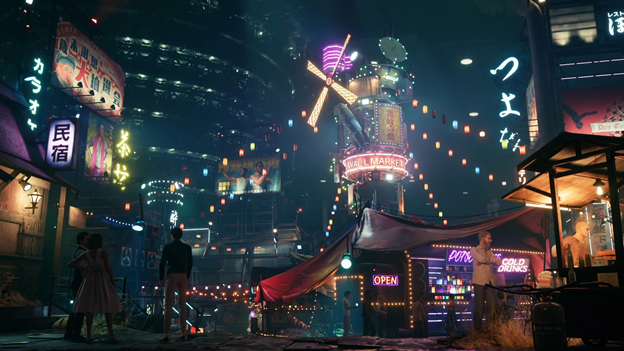
Bright Lights, Slum City
As enjoyable as that branch of gameplay is, though, the biggest draw of the remake is the way it expands on the story of FF7, both in the narrative and presentation departments. And while you’d expect that taking a roughly five-hour segment of a game (especially a pretty linear one) and stretching it to nearly tenfold would lead to ungodly amounts of fluff, the remake’s emphasis on adding characterization and recontextualization more than make up for the few areas that drag, in addition to just translating the world we know into a more fleshed-out entity.
The industrial mega-city of Midgar has always stood as one of Square’s most memorable locales, despite a good amount of its scope being left to player imagination. But in this remake, everything that was once just flavor text or subtle implication gets thrown to the forefront, breathing some meaningful life into the dystopian society the original presented. Take, for example, the opening Bombing Mission: the 1997 version of events has Cloud and members of the eco-terrorist group AVALANCHE jumpstart the plot by blowing up one of the city’s eight mako reactors, which is then followed by a brief first encounter with a certain florist and then a train ride back to home base in the Sector 7 slums in the span of, like,15 minutes. But before you get to hitch that ride to the slums in FF7R, the game dedicates time to show you the immediate consequences of that mission, having you tread through the Sector that housed the reactor: buildings are all up in flames, Shinra workers are scrambling frantically to find their families, and innocent civilian lives are left either upended or entirely extinguished. The feelings generated by this added sequence to the story are palpable, and aim to leave the player with a more lasting impression than if the game had stuck neatly to the script.
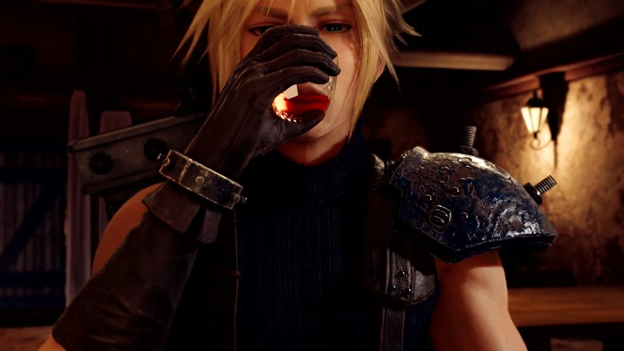
Cloud’s drinking problem has only gotten worse since
This extra dimensionality permeates most of your guided tour through Midgar, from the chapters you spend doing merc work in the grungy slums of Sector 5 and 7, to your extended stay in the neon den of debauchery that is Wall Market. Whatever time spent outside of fights is used in service to accentuate the player’s connection to the world and supplement the main story as it plays out. And whether it’s walking through town and hearing idle gossip about your handiwork, challenging the local effeminate bodybuilder to a squat-off, or just tuning out to hear Nobuo Uematsu’s stellar OST dynamically punctuating every moment, FF7R tries its damndest to bring Midgar into the new age with a mix of reverence for the classic and modern game-y charm.
That being said, there are definitely some issues from the expansion process that detract from the grandeur: all the hi-res graphics come at the expense of excessive cramped spaces and hidden loading screens, there’s some inconsistent pacing in the second act especially (*cough* Train Graveyard), and many of the side quests are as rote as they come. But these are ultimately small drops in the bucket that come with modern sensibility, and only really stand out because the rest of the time spent seems so meticulously crafted. And because of the remake’s decision to ultimately treat this small portion of the overall narrative as both a set-up for future installments and a self-contained story, these integrations end up making what story bits we do get, whether they’re blasting through beat-for-beat sequences fans remember or the new YAKUZA-esque diversions from the forward momentum, feel that much more personal.
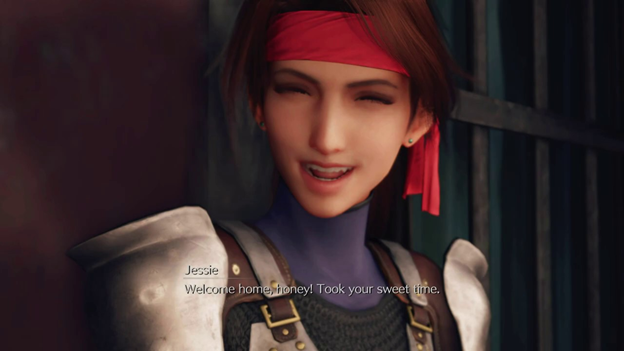
The Waifu Wars gain a new faction. Humanity is doomed.
This personal vibe the remake provides ultimately culminates with the beating heart of the experience, the game’s cast. Say what you want about the plot delivery or the scope of the work itself, but one thing should remain perfectly clear: as cliche as it sounds, FF7 would not be nearly as beloved as it is if it weren’t carried by its characters. And thankfully, all the extra time spent with not only our main entourage, but the resources devoted to fleshing out everyone, work toward making the journey feel as special as it does.
It goes above and beyond to endear us to the personas it has created, building on the bases the original provided with well-written interactions that develop and humanize enough to make reliving the plot threads worthwhile. Cloud may still be the awkward dork playing the emotionally-vacant ex-SOLDIER fans remember, but we get to dissect his motivations through added flashbacks, hear his voice crack when put in flirty situations, and watch his facade slowly chip away throughout the game via how he communicates with his team. We see non-party members like the AVALANCHE crew go from having 10 collective lines of dialogue to boasting backstories and stand-out personalities, adding to the story in their own meaningful way by supplying worldbuilding moments like a “private mission” with Jessie to the upper plate, or providing deeper context for characters like Barret in showing how he’s able to maintain such a loyal following. And while these may seem like simple addendums to what should have already been in the base game, these added character moments pull new and old fans along for the ride, making not only the story and the themes it’s trying to communicate stronger, but makes our attachment to what happens, whether it’s how fans expect the tale to play out or something completely new, more emotional in the process.
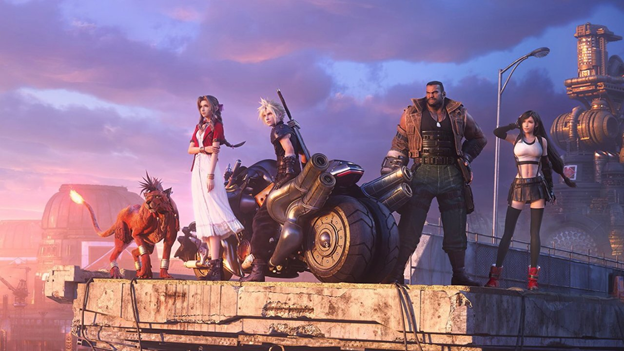
The story will continue…eventually
There’s no doubt that FINAL FANTASY VII REMAKE will occupy a strange space in the cultural zeitgeist: it is at once a game that lovingly recreates its source material for a new generation, and one that openly defies the expectations placed on it. It’s a game that retains the feelings of the old in structure and subject, while pushing for its own, new identity. And no matter what boundless, terrifying freedom waits in store for the rest of this remake experience going forward, the successes of this first installment leave me optimistic for what the future holds.


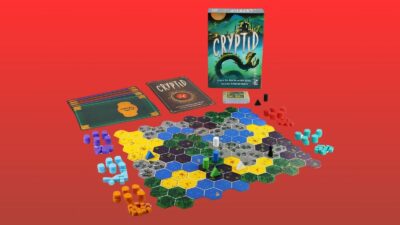

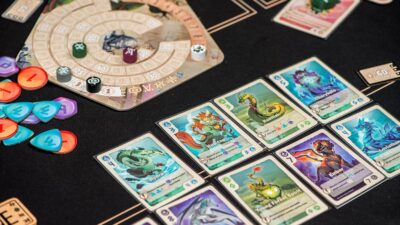
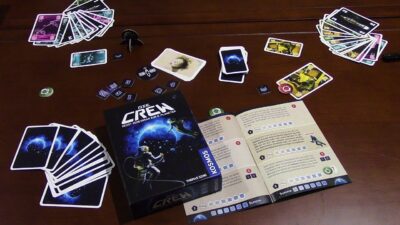


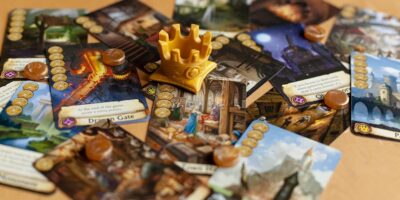



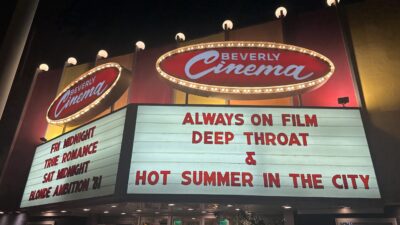



Comments